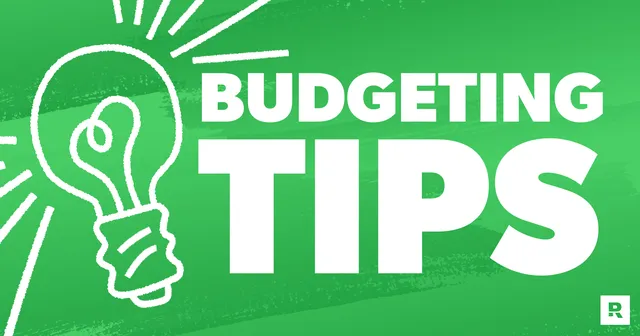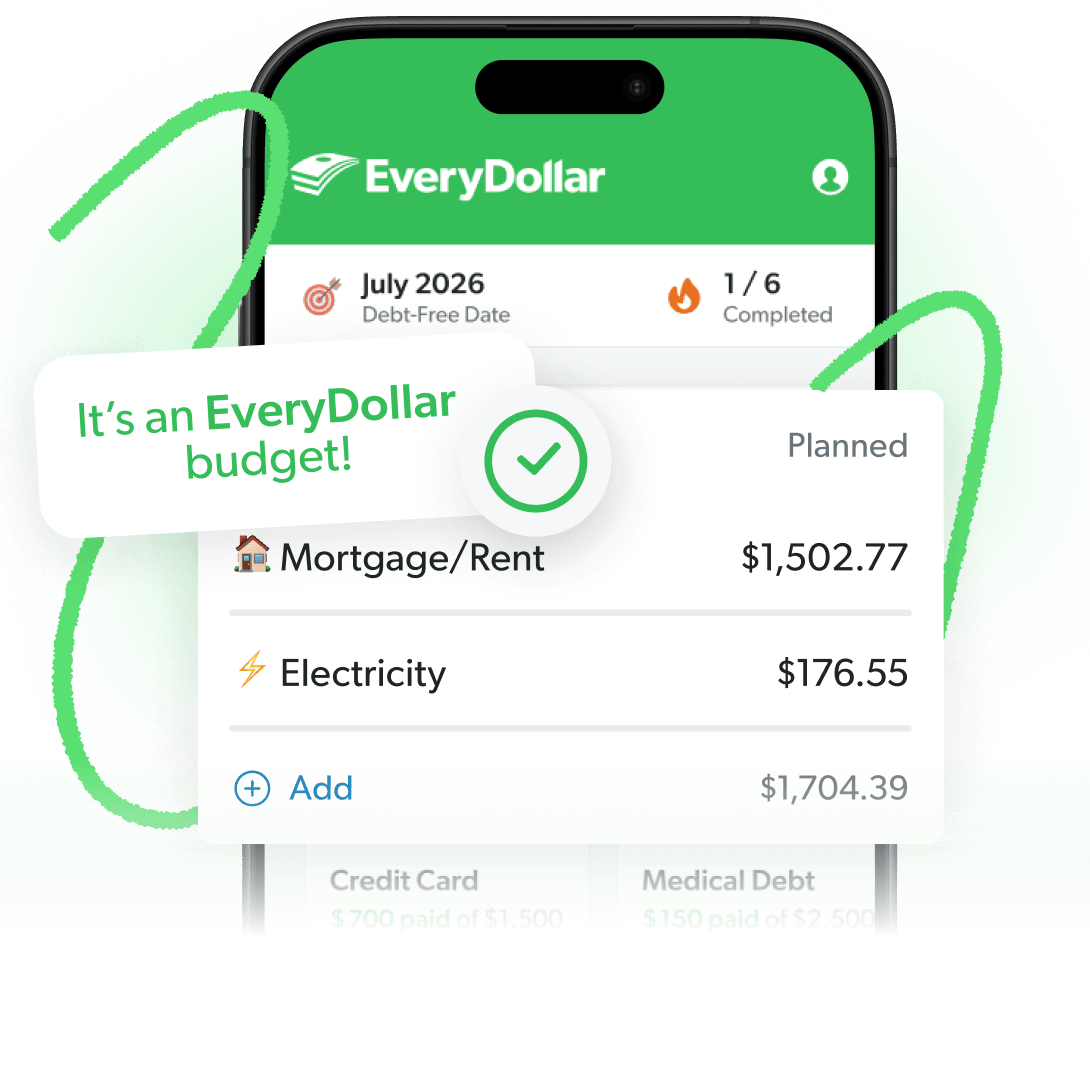Key Takeaways
- A budget helps you take control of your money. It’s not about restriction—it’s about cutting down stress, stopping the paycheck-to-paycheck living, and giving yourself permission to spend without guilt.
- Create a zero-based budget before the month starts. Cover the essentials first and then tweak your plan as needed for seasonal expenses, irregular bills or shifting goals.
- Make budgeting a habit. Check in on a regular basis, track all your spending, and give yourself grace as you learn. Don’t expect perfection right away. It takes about four months to really get the hang of it.
Budgeting isn’t easy, especially when you’re just getting started. It can feel overwhelming and even frustrating at first. But we promise—budgeting is for you. Like most things worth doing, it just takes a little dedicated time to get the hang of it.
Budgeting is the best way to cut stress and stop living paycheck to paycheck. Plus, you might be surprised to see how much extra money you actually have each month. It can feel like giving yourself a little raise! That’s a massive step toward your money goals. And it gives you permission to spend, guilt-free.
Yeah, I’d say that’s worth the effort.
So whether you’re new to this whole budgeting thing (prepare to have your mind blown) or you’re ready to level up, I’ve got 15 simple budgeting tips to help make the whole process easier. That way, you can feel more confident and more in control all while making real progress with your money.
And before we get started—let’s bust a few budgeting myths out of the gate:
- Yes, you do have time to budget (promise).
- No, you can’t just budget in your head.
- No, a budget is not restricting. It’s freedom.
Got all that? Let’s dive in.
15 Budgeting Tips to Manage Your Money Better
1. Create a zero-based budget before the month begins.
Okay, we’re kicking things off with the most important budgeting tip. I find that budgeting works best on a monthly basis. That gives you a wide lens to look at your spending this month and leaves room for adjusting it if you need to. So, before the month even starts, make a plan and give every single dollar a job. This is what we call a zero-based budget.
And no, that doesn’t mean you have zero dollars in your bank account. (Leave a buffer of a few hundred dollars.) It just means your monthly income minus all your monthly expenses equals zero.
Doing a zero-based budget is how you make sure none of your money slips through the cracks or gets spent by accident. And doing it before the month starts? That’s how you stay ahead and take full control of your money from the very first dollar.
2. Budget as a team.
Budgeting works best when everyone’s on the same page. If you’re married, set aside time each month for a budget meeting. This is your chance to set goals together, talk through what’s coming up, and make sure your money is working for both of you.
If you’re single, find someone who’ll cheer you on and help you stay focused. The key is not going it alone. When you have a plan to take control of your personal finances and a person you trust to hold you accountable, you’ll feel more connected, motivated and in control.
Find Margin You Didn’t Know You Had With EveryDollar
The EveryDollar budgeting app helps you find extra money every month so you can beat debt, build wealth, and make progress. Every. Day.
3. Prioritize the essentials.
Start your budget by covering what matters most. That means giving and saving first. Then focus on the Four Walls: food, utilities, shelter and transportation. These are your core needs, the things that keep your life stable and your household running.
Once you’ve covered the essentials, you can start budgeting for everything else. Taking care of your basic needs before your wants means you can breathe a little easier—and make smarter choices with the rest of your money.
4. Overestimate your expenses (especially at first).
When you’re just starting out, it’s easy to underestimate how much you actually spend—especially in categories like groceries, gas or eating out. So give yourself a little margin and overestimate your expenses in those areas.
This helps you get a more honest picture of your spending habits—and avoid busting your budget right out of the gate. As you go on, you’ll get better at fine-tuning the numbers. But for now, round up and give yourself some wiggle room.
5. Adjust your budget for each month.
No two months are exactly the same—your budget shouldn’t be either. Some months bring seasonal expenses like back-to-school supplies or routine car maintenance. Others might be filled with celebrations like birthdays, holidays or that vacation you’ve been looking forward to.
Take a few minutes at the start of each month to look ahead. What’s coming up? Use your calendar to pinpoint special events, irregular bills or anything that might impact your spending. Staying ahead of your monthly expenses helps you avoid last-minute stress and set your budget—and yourself—up for success.
6. Make paying off debt a priority.
If you’ve got debt, you need to make paying it off a priority in your budget. Debt keeps you stuck—and it steals the very thing that helps you move forward: your income.
The best way to knock out your debt is with the debt snowball method. You focus on your smallest debt first—throw every extra dollar you can at it while paying the minimum payments on the rest. Once that smallest debt is gone, you roll that payment into the next smallest. As you knock out each debt, the amount you’re paying keeps growing so you can be completely debt-free faster.
That’s why the debt snowball works—you get quick wins that keep you motivated until you reach your goal!
7. Cut unnecessary expenses.
Sometimes the budget needs a little trimming. If money’s tight right now, see what you can cut to give yourself more breathing room. Maybe you switch to just one streaming service, skip eating out this month, or shop at a cheaper grocery store. These little shifts can make a big difference.
And remember, this doesn’t have to be forever. You’re creating margin to help you hit your money goals faster. You can always adjust and add things back in. That’s the beauty of budgeting: You’re in charge.
8. Automate your bill payments.
Let’s be honest: Paying bills isn’t exactly fun. But automating some of them can save you time, help you avoid late fees, and keep life just a little more organized. Set up autodrafts for things like your rent or mortgage, utilities or insurance.
Just be sure you’re still keeping an eye on your bank account. You don’t want five bills hitting the same day you make a big grocery run and accidentally send yourself into overdraft. A few minutes of planning can save you a whole lot of stress—and keep your budget running smoothly.
Here's A Tip
EveryDollar’s paycheck planning feature helps you line up your bills with your income, so you’re not caught off guard when everything’s due before payday.
9. Set clear financial goals.
Every great money plan starts with one simple question: What’s your why? Maybe it’s getting out from under those student loans, building an emergency fund, or paying off your home. Whatever it is, your why is what keeps you going when budgeting feels hard.
So, get clear on your goals—and make them personal. Write them down. Put them where you’ll see them. And give each one a timeline. When your why is front and center, it’s a whole lot easier to stay motivated, especially on the days you’d rather do anything but budget.
10. Check in regularly.
Your budget isn’t a one-and-done thing. It’s a living plan that needs regular check-ins.
Track your spending daily so you always know where your money’s going. I also recommend setting aside time each week to intentionally review your budget and make sure you’re still on track.
And if you’re budgeting with your spouse, I can’t say this enough: Make it a team effort. Sit down together to talk through what’s working and what needs adjusting. These check-ins keep you on the same page and help you make smarter money choices together.
11. Add a miscellaneous budget line.
Here’s a quick tip that can save your whole budget: Add a miscellaneous line! I always make sure to set aside a small amount for those little things that pop up during the month—because let’s be real, something always does.
That way, when unexpected expenses hit, you’re ready. You won’t have to dip into your grocery money or steal from another category.
And if you notice the same type of expense showing up again and again in that line? It’s time to give it a permanent spot in your budget.
12. Stop relying on credit cards.
If you want to really take control of your money, the credit cards have got to go. Hear me out!
Even if you pay them off each month, using credit cards makes it hard to track where your money is going—and that can lead to overspending. And if you’re carrying a balance? That interest is eating up your income and keeping you stuck.
So, ditch the credit cards . . . for good. Cut them up, cancel the accounts, and stick to your debit card or cash. When you only spend what you actually have, you’ll feel the difference—and your budget will too.
13. Use cash for problem spending areas.
If you keep overspending in certain categories (like groceries, fun money or eating out), try paying with cash instead of plastic. Better yet, use the cash envelope system to really keep you disciplined.
Just take out the exact amount you’ve budgeted, stick it in an envelope, and only spend the cash you have on hand. When the cash is gone, you’re done spending. It’s simple, powerful and the ultimate accountability partner.
14. Practice contentment over comparison.
The moment you start comparing your life to someone else’s, you open the door to frustration and overspending. Maybe your friend gets a new car or posts about a beach vacation, and suddenly your paid-off car or staycation doesn’t feel like enough.
Comparison doesn't just steal your joy—it can steal your paycheck too. So stay focused on your goals, your progress and the life you’re building. Contentment is your secret weapon that keeps you grounded, grateful and moving forward.
15. Give yourself grace.
Budgeting takes practice. It usually takes about three to four months to really get the hang of it. So don’t expect perfection right away.
Your first budget (or even your second or third) might feel messy, but that’s okay. Give yourself—and each other, if you’re married—grace, learn from the bumps, and keep going. Progress matters more than perfection. You're building something good—just keep showing up.
Get a budgeting app that works for you.
Scribbled notes and mental math won’t help you take control of your money. You need a budgeting app that will keep you organized and seriously boost your budgeting game.
With the EveryDollar app, you can easily create your zero-based budget, track your spending, and stay on top of your money. It even lets you sync with your spouse—so you’re both on the same page and working towards the same goals.
Ready to start telling your money where to go (instead of always wondering where it went)? Just download the EveryDollar app, answer a few questions, and we’ll build you a personalized plan, based on your situation, to free up margin and make the most of every dollar. Every day. (See where we got the name?)
Get started with EveryDollar for free right now!




